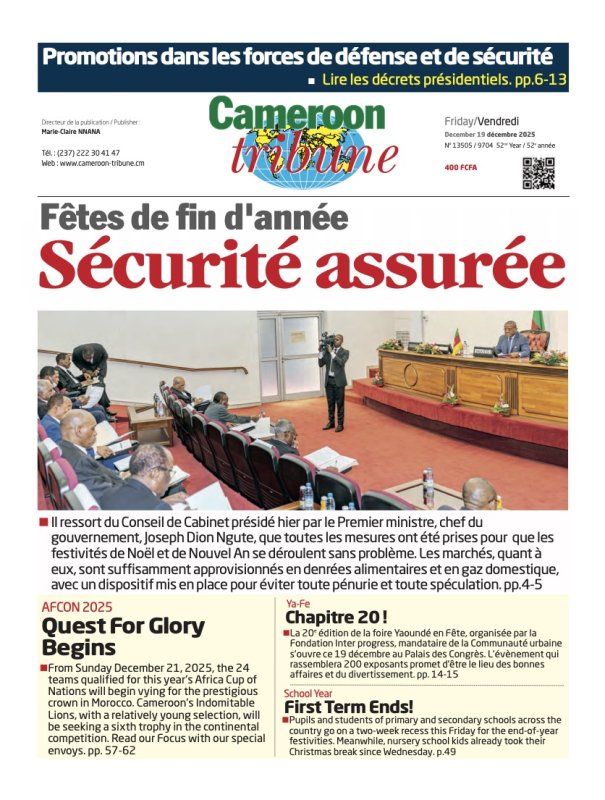Professional football in Cameroon has been such a hard road to travel. Some even say categorically that football in the country is sick. To others, it is even agonizing at the level of local clubs. The last time a Cameroonian club side won a continental trophy was in 1981 when Union Sportive of Douala lifted the Cup Winners Cup beating Stationery Stores of Nigeria 2-1.
Forty-two years down the lane, local football in has kept a nose dive. The situation is unpleasant enough to charge football managers and officials of poor performances. It is very unbefitting in the land of the Indomitable Lions holding a record in Africa of eight participations at the FIFA World Cup final phases yet, unable to have a viable local league. As a reminder, Cameroon opened its bank of participation at the World Cup in 1982 in Spain with three undefeated though un-winning outings. Subsequently, Cameroon’s Lions were in Italy in 1990, United States in 1994, France in 1998, South Korea/Japan in 2002, South Africa in 2010, Brazil in 2014, and Qatar in 2022.
Locally, Coton Sport of Garoua that keeps dominating the home-grown play in Cameroon as cup winner or league champion has continued to swallow dust in the face of other African clubs. Coton, again, was just last week spanked away and return by Al Halal of Sudan knocking them out of the African competition. Coton’s debacle on the international scene has run for over a decade, always wagging its tail in-between the legs each time they face a foreign team. Aside from Coton, a few other teams from Cameroon have attempted a few outings equally bringing home very disconsolate results.
Two glaring causes may explain Cameroon local football debacle. Firstly, Cameroon is vulnerable to the international football community as a hatchery of talents. Whenever a good kicker of the balloon is spotted in Cameroon, the next plane flight is booked for them to greener pastures. Why? The bait is sufficiently tempting for the young players over there with offers of better pay, better insurance, better livelihood and clearer prospects for a better career. And so, talent bleeding in Cameroon leaves the local football game less attractive to spectators. As such, stadiums are empty and void of financial income flow.
Secondly, the structure of clubs in Cameroon lacks the business tint. The clubs are void of clear and sure channels of funding. The clubs also suffer a lot of bickering among leaders as they are more or less conceived as interests for just a handful. Hitherto big clubs like Canon of Yaounde, Union of Douala, Tonnerre of Yaounde, and Dynamo of Douala are eventual shadows of their past account. Other names like Oryx and Racing are virtually silent on the lips of fans these days.
Yet, the State has chiselled out billions of CFA from tax payers to provide state-of-the-art stadia across the country to promote the sport. Such facilities, as world standard football temples, are planted in Bafoussam, Limbe, Garoua, Yaounde and Douala. Many others are in the pipeline. What can be a better encouragement from the State to elevate the sport in the country if not to provide the necessary infrastructure?
The fact of low performance by local clubs in Cameroon has driven football managers to rethink strategy after strategy. The current President of Cameroon’s football governing body, Samuel Eto’o Fils was in Limbe (South West Region) a forth night ago to launch the Regional championship. His, was another anxious effort repeated to give local football a new impetus. But who says this time around can be better? The clubs, on their part, are lacking and lazing. The transition to professionalism is dragging for too long. Promises have moved from mouth lip to mouth lip with no concrete assurance of effectiveness.
What then should be done? Where are the clubs that produced the likes of Roger Milla, Samuel Eto’o Fils, Thomas Nkono, Bell Joseph Antoine, and the whole glorious generation of Cameroon footballers? Those legends are now aced and many of them have been centrally involved in the management of local football. What, again, still constitutes the hair in the soup of professionalizing football in Cameroon? Even if Cameroon is the supplier of footballers across the world, what makes it impossible to water the nursery for more so that some can perform at home if others have to leave?
Football pundits have suggested the opening of shares in clubs arguing that this would enable quick and steady flow of funds to keep players comfortable. Other ideas have sprung up favouring the creation of different levels or categories of teams in the same club to constitute a nursery for continuity. Clubs need to nurse long term visions, to generate funding, and charm spectators. Footballers on their own part have only blo...
Cet article complet est réservé aux abonnés
Déjà abonné ? Identifiez-vous >
Accédez en illimité à Cameroon Tribune Digital à partir de 26250 FCFA
Je M'abonne1 minute suffit pour vous abonner à Cameroon Tribune Digital !
- Votre numéro spécial cameroon-tribune en version numérique
- Des encarts
- Des appels d'offres exclusives
- D'avant-première (accès 24h avant la publication)
- Des éditions consultables sur tous supports (smartphone, tablettes, PC)











Commentaires